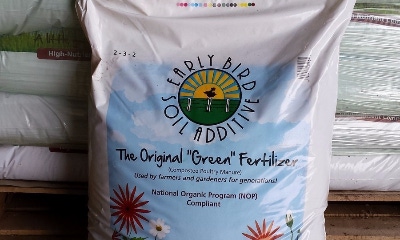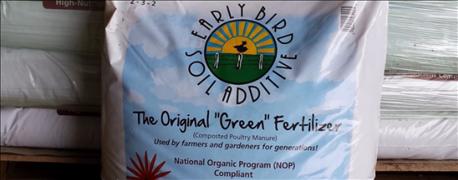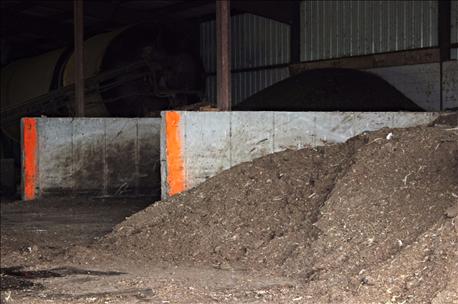
In 2001, a group of turkey growers in mid-Missouri met to discuss the growing volume of litter from expanding facilities in the area. Paul Allee, a turkey grower from Moniteau County, was at the meeting.
"We were looking for something that helps the environment, helps the soil and reduces runoff," he says. The group agreed on a plan to compost litter and sell it to farms, nurseries and gardeners.

RETAIL REVELATION: The Central Missouri Poultry Producers cooperative started bagging its producing under the Early Bird label to garner more value from their litter.
The Central Missouri Poultry Producers cooperative uses a composting process that complies with the National Organic Program that insures that there is no runoff or groundwater contamination. Composting is a method of speeding natural decomposition under controlled conditions. The entire composting facility is housed in a large, metal machine shed.
Building design
Litter is stacked in the shed before it enters the drum. Poultry manure is added to a large metal drum daily. There it goes through in the composting process where it is heated to a temperature of 130 to 145 degrees F. "This kills off the weeds and any bacteria," Paul explains.
It is a slow process. It takes roughly 15 minutes for the massive cylinder-shape drum to turn one complete revolution. The load of litter will be in the drum for up to 3 days before reaching the cooperative's specifications. Then the finished product goes through a screen to remove any rocks or large pieces of debris.
Adding to its environmentally friendly focus, the equipment used to produce the compost is remanufactured from salvaged equipment.

UNDER ROOF: Poultry litter is stacked in piles waiting to be placed in the composter. The large round composter is located at the back of the storage facility keeping weather from affecting the product during processing.
In all, Paul says, the drum will produce 1,500 to 2,000 tons of compost per year. A portion of the finished product is stored in the shed for bulk sales to area farmers. However, the cooperative members bag some of the compost and distribute it to retail stores.
Market options
On any given year, there will be 10 semi-truck loads of composted poultry litter from CMPP heading to northern Missouri, more specifically Clark County. "There is a large Amish community up there that purchases a lot of our compost," Paul explains.
Farmers were the first to use the compost when the cooperative began and continue to be a key market. It is spread on cropland and grassland throughout the state. But the group of turkey growers saw another opportunity to add value to their piles of manure.
They invested in a bagging machine and began to sell their products under the name Early Bird Compost. It is guaranteed to test out at 2% total nitrogen, 3% available phosphate and 2% soluble potash, Paul explains. "It is regulated by the agriculture department," he notes. "It also provides customers with consistency in our product."
The bags can be purchased a retail location throughout mid-Missouri.
The interest was so great that the cooperative built a second building to house more litter.
About the Author(s)
You May Also Like






